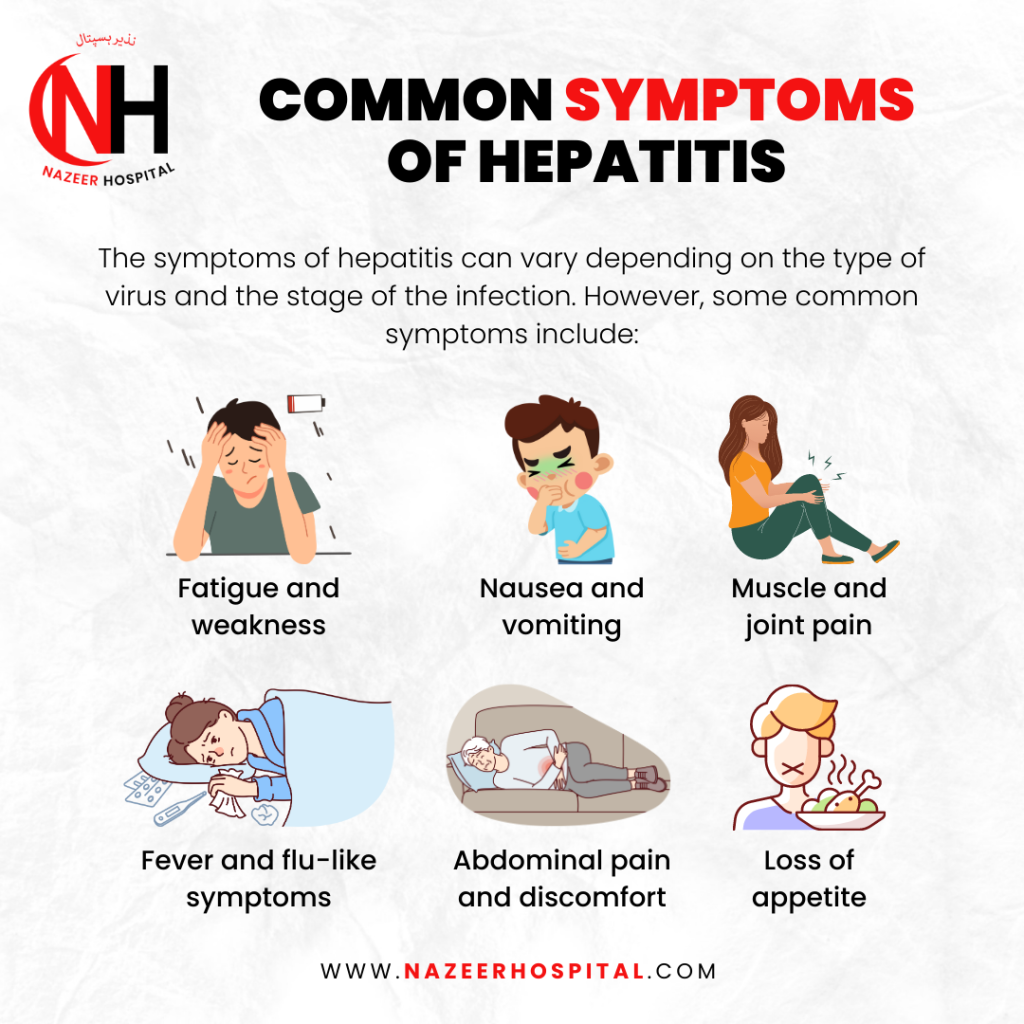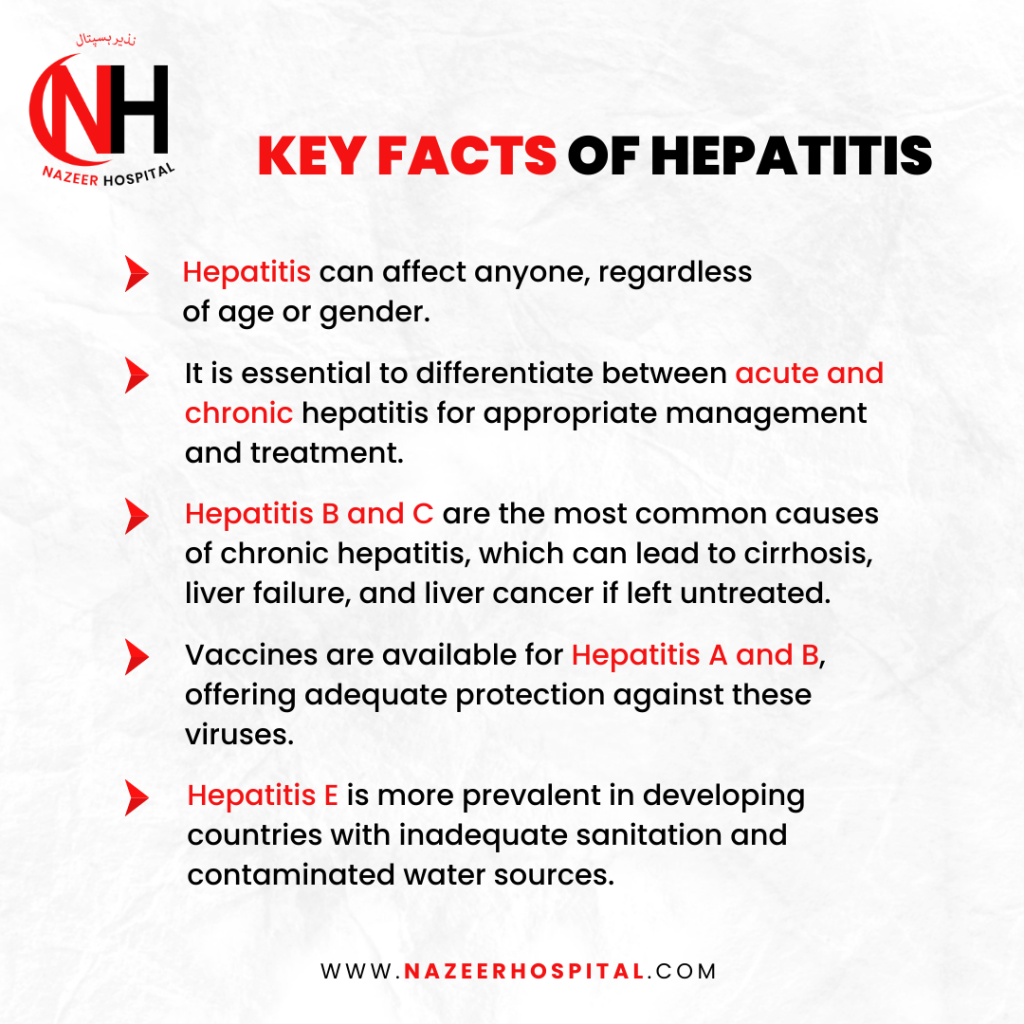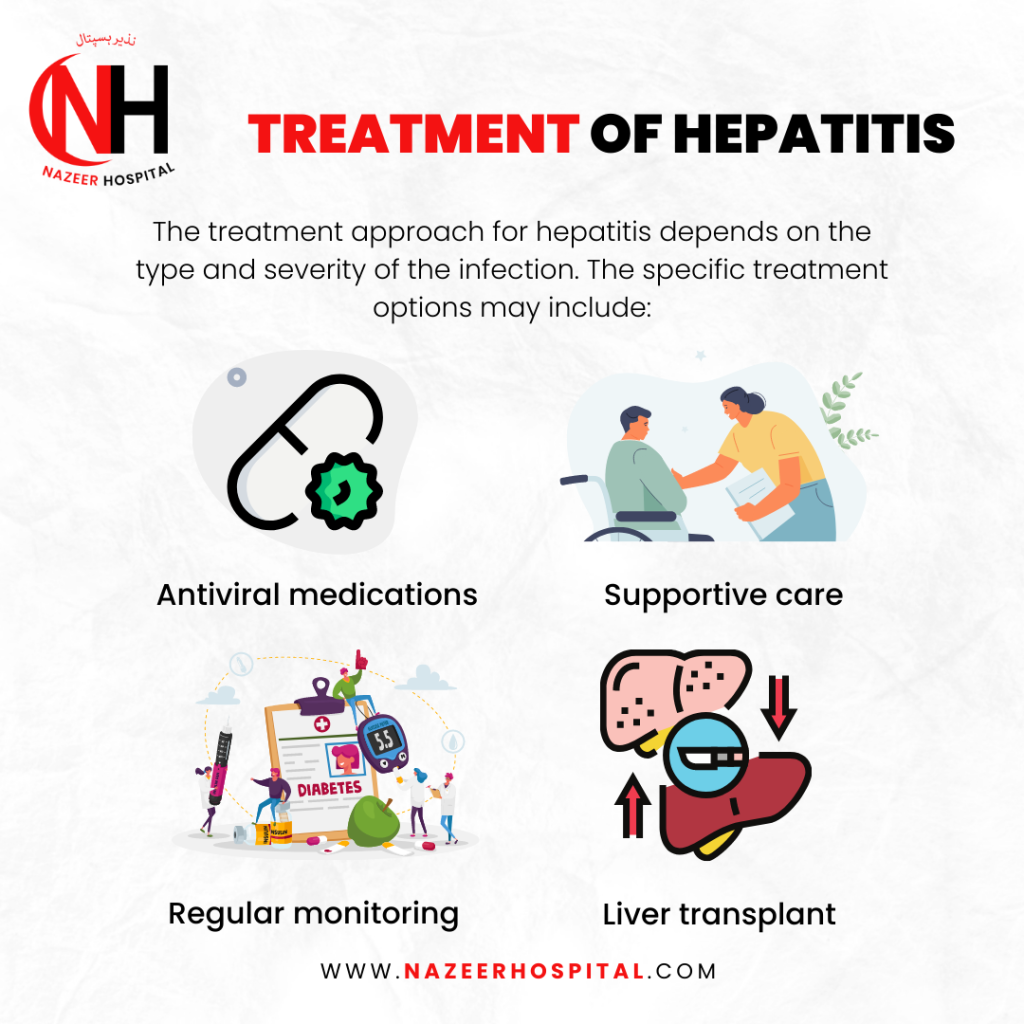Hepatitis Treatment in Pakistan:
Facts, Symptoms, Diagnosis & Treatment
Updated on July 28, 2023

Understanding the key facts, symptoms, diagnosis, and hepatitis treatment in pakistan is crucial in managing this condition effectively. Hepatitis is a prevalent viral infection that affects a significant number of people in Pakistan. This blog aims to provide comprehensive information on hepatitis, including its types, causes, transmission, diagnosis, treatment, prevention tips, and more.
What is Viral Hepatitis?
Viral hepatitis refers to liver inflammation brought on by viral infections. The liver filters toxins from the body, produces essential proteins, and aids digestion. When viruses infect the liver, they cause inflammation and disrupt its normal functioning. Hepatitis A, B, C, D, and E are among the many forms of viral hepatitis. Each type has its specific characteristics, transmission modes, and varying severity levels.
What Causes Hepatitis?
Viral infections primarily cause hepatitis. Every form of hepatitis is caused by a distinct virus. Hepatitis A is caused by the Hepatitis A virus (HAV), Hepatitis B by the Hepatitis B virus (HBV), Hepatitis C by the Hepatitis C virus (HCV), and so on. These viruses enter the body and infect the liver, leading to inflammation and liver damage. Other less common causes of hepatitis include alcohol abuse, certain medications, toxins, and autoimmune disorders.

How Long Does Hepatitis Last?
The duration of hepatitis varies depending on the type and individual factors. Acute hepatitis can last for a few weeks to several months. In some cases, the infection resolves independently without any specific treatment. However, chronic hepatitis persists for at least six months and may require long-term management and medical intervention.
- Consuming contaminated food or water (Hepatitis A and E)
- Exposure to blood or bodily fluids contaminated with Hepatitis B, C, and D can lead to infection.
- Unprotected sexual intercourse (Hepatitis B and C)
- The act of sharing needles or other drug paraphernalia can result in the transmission of Hepatitis B and C
- From an infected mother to her child during childbirth (Hepatitis B)

Who Should Be Tested?
It is recommended to get tested for hepatitis if you:
- Have a history of blood transfusions or organ transplants
- Share needles or have used illicit drugs
- Engage in unprotected sexual activities
- Have received tattoos or body piercings with unsterilized equipment
- Are healthcare workers exposed to infected blood or bodily fluids
- Were born to a mother infected with hepatitis
- Have signs or symptoms of hepatitis

How Is Hepatitis Diagnosed?
To diagnose and perform hepatitis treatment in pakistan, healthcare professionals may perform several tests, including:
Blood Tests: These tests detect the presence of viral markers and assess liver function. They can help determine the type of hepatitis and whether it is acute or chronic.
Imaging Tests: Imaging techniques such as ultrasound, CT scan, or MRI may be used to evaluate the liver’s health and detect abnormalities.
Liver Biopsy: In some cases, a small sample of liver tissue may be obtained through a biopsy procedure. This sample is then examined under a microscope to assess the degree of inflammation and liver damage.
Tips To Prevent Hepatitis
The role of prevention is pivotal in alleviating the burden of hepatitis. Here are some necessary preventive measures:
Vaccination: Hepatitis A and B have vaccines readily accessible. It is recommended to get vaccinated to protect yourself from these viruses. The hepatitis B vaccine is essential for high-risk individuals, such as healthcare workers, people with multiple sexual partners, and those who inject drugs.
Practice Good Hygiene: Wash your hands thoroughly with soap and water before meals, after using the bathroom, and after contacting potentially contaminated surfaces. Avoid consuming food or water from unreliable sources, especially when traveling to areas with inadequate sanitation.
Safe Sexual Practices: Practice safe sex by using barrier methods of contraception, such as condoms, to reduce the risk of Hepatitis B and C transmission.

Avoid Sharing Needles: If you use injectable drugs, always use sterile needles and never share them with others. Additionally, avoid sharing personal items that may come into contact with blood, such as razors or toothbrushes.
Be Cautious During Medical Procedures: Ensure that medical and dental procedures involving needles or other invasive instruments follow proper sterilization protocols to prevent the transmission of hepatitis.
Get Screened And Seek Early Treatment: If you are at risk or experiencing symptoms of hepatitis, it is vital to get tested and seek early medical intervention. Early diagnosis and treatment can prevent further liver damage and improve the prognosis.
Conclusion
Hepatitis is a significant public health concern in Pakistan. Understanding the key facts, symptoms, diagnosis, and hepatitis treatment in Pakistan is crucial in effectively managing and preventing this condition. By raising awareness, promoting vaccination, practicing good hygiene, and seeking early medical intervention, we can work towards reducing the burden of hepatitis in Pakistan and improving liver health for all.
Frequently Asked Questions
Jaundice refers to the yellowing of the skin and eyes due to a buildup of bilirubin in the body. It is a symptom that can occur due to various underlying conditions, including hepatitis. Hepatitis, on the other hand, specifically refers to the inflammation of the liver caused by viral infections.
While some individuals with acute hepatitis may recover without specific medical treatment, consulting a healthcare professional for appropriate diagnosis and management is essential. Chronic hepatitis often requires medical intervention to control the infection and prevent liver damage.
The window period for hepatitis B refers to the time between the initial infection and when specific virus markers can be detected in the blood. The timeframe can span from a few weeks to several months. During the window period, individuals may test negative for hepatitis B, even if infected. Confirming the diagnosis may require additional testing to be conducted.
While there are no specific diet charts for hepatitis patients, following a balanced and nutritious diet is generally recommended. This may include consuming adequate protein, fruits, vegetables, whole grains, and healthy fats. Avoiding alcohol and foods that may further strain the liver is also essential.
Hepatitis B and hepatitis C are caused by different viruses (HBV and HCV, respectively) and have different modes of transmission. Hepatitis B is more commonly transmitted through contact with infected blood or bodily fluids. In contrast, hepatitis C is primarily transmitted through blood-to-blood communication, such as sharing needles or receiving contaminated blood transfusions.
The risk factors for contracting hepatitis include:
- Exposure to infected blood or bodily fluids
- Unprotected sexual intercourse
- Injection drug use
- Sharing needles or other drug paraphernalia
- Receiving blood transfusions or organ transplants before proper screening measures were implemented
- Having a mother infected with hepatitis
- Working in healthcare settings with potential exposure to infected blood or bodily fluids
Oral symptoms of hepatitis may include a metallic taste in the mouth, dry mouth, sore or swollen gums, mouth ulcers, and a yellowish coating on the tongue. However, it is essential to note that oral symptoms can be nonspecific and may vary among individuals.
Acute hepatitis refers to the initial phase of the infection, which is usually of short duration. Symptoms such as fatigue, jaundice, and abdominal pain can manifest as a result. Acute hepatitis may resolve on its own or progress to chronic hepatitis. Chronic hepatitis persists for at least six months or longer and may lead to long-term liver damage if left untreated. It is crucial to seek timely medical attention for hepatitis treatment in Pakistan.
Dr. Masooma Husnain

M.B.B.S
I am a medical doctor at Nazeer Hospital, passionate about providing exceptional healthcare and support to my patients. Alongside my medical practice, I have also established myself as an accomplished author, contributing insightful articles to various publications in the field of medicine and healthcare.
With a solid educational background and clinical experience, I have honed my skills across multiple specialties as a House Officer at Pakistan Railway Hospital. My diverse experiences encompass rotations in General Medicine, Pediatrics, Orthopedics, and General Surgery, giving me a well-rounded understanding of different medical disciplines.
As an author, I leverage my expertise and in-depth knowledge to create informative and engaging articles that address contemporary healthcare challenges, treatment approaches, and patient care. My writing style reflects a blend of medical professionalism and a talent for conveying complex medical concepts in an easy-to-understand manner.
With a solid educational background and clinical experience, I have honed my skills across multiple specialties as a House Officer at Pakistan Railway Hospital. My diverse experiences encompass rotations in General Medicine, Pediatrics, Orthopedics, and General Surgery, giving me a well-rounded understanding of different medical disciplines.
As an author, I leverage my expertise and in-depth knowledge to create informative and engaging articles that address contemporary healthcare challenges, treatment approaches, and patient care. My writing style reflects a blend of medical professionalism and a talent for conveying complex medical concepts in an easy-to-understand manner.

